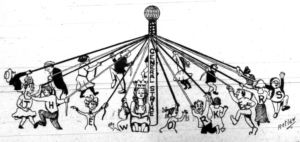
“Trump Is Pat Buchanan With Better Timing” feels like a current headline eight years after it ran in Politico. Is America trapped in a rerun of the Republican Revolution of ’94, with the platforms of “presidential candidates Buchanan, David Duke and Ross Perot — the most visible figures of the political fringe” perpetually mainstreamed? The New York Times Book Review‘s Jennifer Szalai is convinced (“Ticking Time Bomb,” June 30). Or in one of the ’80s, “When Greed Was Good” — Jacob Goldstein’s headline on the facing page of the Book Review.
Goldstein writes that the cultural catchet of financial flummery made “the United States suddenly fall in love with finance while inequality skyrocketed,” suggesting Billy Joel-style verses about the likes of “Milton Friedman’s ‘Free to Choose,’ Jane Fonda, running shoes.” At the time, Mother Jones quipped that the rock star “ain’t ‘livin’ here in Allentown'” after “marryin’ a … fashion model.” Nowadays, an ode to Air Jordan marketing from Matt Damon, previously known for plugging Howard Zinn’s People’s History, raises few eyebrows.
The line from Gekko to Gingrich needs little elaboration when Szalai places the sociopolitical rancor of the early 1990s “atop a wreckage of junk bonds, bank failures and vacant skyscrapers” of “the debt-fueled growth of the ’80s.” While Friedman was civil enough in his limited-government sentiments to be a PBS host, Szalai finds one of the most vocal supporters of Buchanan’s 1992 campaign in “the libertarian economist Murray Rothbard” who considered George Herbert Walker Bush’s re-election bid “too timid and polite.”
Szalai traces Rothbard’s “taste for conflict” to his juvenile insistence that “Communist aunts and uncles” were too harsh on Francisco Franco’s repressive rightist regime in Spain. Yet Rothbard’s pugnaciousness led him to positions unhinted at by Szalai’s selections. In 1988, he advocated voting for Democratic “cautious spender” Michael Dukakis since Bush was providing “only lip service to the free market.” His Libertarian Forum berated Friedman for providing “a free-market cloak for state despotism” in Augusto Pinochet’s Chile and recommended an “angry dissection of the intellectuals in the ruling class” by Noam Chomsky.
Buchanan offered meager warmth to his libertarian bedfellows, who he said “don’t know anything about American history” when Rothbard’s publications identifying the ills of intervention included four volumes on the Revolutionary period alone. Llewelyn Rockwell recalled that by 1995, Rothbard could see that Buchanan’s “commitment to protectionism was mutating into an all-round faith in economic planning and the nation state;” by 2002, hostility to international comity ranged from the Buchanan who “hates China and the developing world” to a President George Bush who “hates the Muslim world” (Rockwell would sum up his administration as “red-state fascism”).
Goldstein notes that Trump’s first presidential term ended with a release of the Michael Milken who personified “the ’80s financialization wave” from boom to bust; the Trump of 1989 drew Rothbard’s mockery for calling Milken overpaid “from his own lofty financial perch.” Real competition in business and political economy would cut Trump’s towering shadow down to size.
New Yorker Joel Schlosberg is a senior news analyst at The William Lloyd Garrison Center for Libertarian Advocacy Journalism.
PUBLICATION/CITATION HISTORY
- “When History Doesn’t End” by Joel Schlosberg, CounterPunch, July 4, 2024
- “SCHLOSBERG COLUMN: When History Doesn’t End” by Joel Schlosberg, The LaGrange, Georgia Daily News, July 5, 2024

